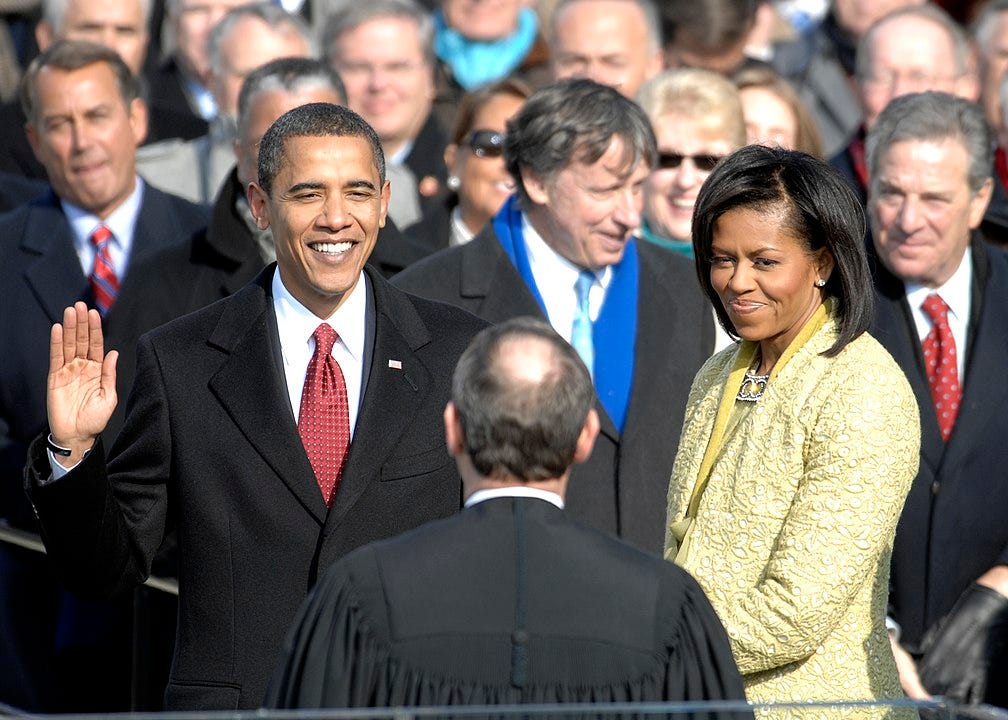…and One Step Back
This week: it’s midnight in America. Also: some notes on the history of presidential inaugurations; and a nifty bus-tracking tool for the north of England.
I’ve been feeling particularly anxious of late, and while parts of that are personal and circumstantial, an unusually large chunk of it this week is not. What follows is not my cheeriest work. If you don’t want to be depressed about the world and its prospects, I suggest scrolling to the next section, which contains stories about an inauguration podium catching fire and some rich people being attacked by a chicken.

Did Elon Musk, the world’s richest man and Donald Trump’s poster-in-chief, really do a Nazi salute at a rally on Monday night? Or did he just thoughtlessly make an awkward gesture that looked uncomfortably like one? Twice?
Despite the amount of internet given over to debating this question this week, I’m not actually sure it matters.1 We know that Musk has a long-standing habit of trolling of a sort most associated with edgelord teenagers, of saying unsayable things to shock and offend. We know, too, that he sincerely holds a lot of extremely right wing views. And we know that he hasn’t issued the horrified apology that most public figures surely would, if debate was raging about whether they’d just done a Nazi thing in public. What response he has – inevitably – tweeted featured a yawn emoji and an attempt to invoke Godwin’s Law.
All those things seem to me to matter more than the exact contents of his heart, which are in any case unknowable. In the same way, I’d be a lot less bothered that certain bits of the media seem so interested in explaining that we can't know it was a Nazi thing, if only they were dedicating as much space to explaining the context that has led people to worry it was the Nazi thing.
Donald Trump’s second inauguration, after all, has come with an unnerving number of features that one might tend to associate with fascism. The pardoning of those who committed street violence for the cause. The designation of a vulnerable minority as the out-group. The deification of a leader that survived a physical attack. (The Origin Story guys have done a far better job of explaining this than I will, but you won’t come out of that feeling any happier, either.)
Most unnerving for the world beyond the US is probably the hints of future territorial expansion, in the form of rumblings about taking back the Panama Canal, although I wouldn’t feel too comfortable if I was in Canada or Greenland either. This, like withdrawing the US from the Paris climate agreement, is not merely terrifying in and of itself, but in the way it could act as a permission slip for others – China, Russia – to do the same. The idea that the great powers can simply take territory at will for no better reason than “I want” is one which held sway for centuries until 1945. A return to that world seems unlikely to increase the sum of human happiness.
That, more than the specifics of Trump or Musk, is perhaps the greatest source of anxiety of all: the sense that we are backsliding. Because… we did this already, right? Yes, the pendulum swings, and right follows left follows right. But we already vanquished these demons – both imperialist aggression in general, and Donald Trump in particular. If they can come back, what else can? Does that make all progress inherently contingent and reversible?
Trump is hardly the only right-wing populist to emerge these last few years. He may be poised to be the cause of much misery, in the US and beyond. But he’s also a symptom of some deeper, broader problem that’s emerged these last 10 years. Were he to die tomorrow, the forces that created him would still be with us.
One of the reasons the events of 1914 were so scarring is that they came after 99 years without an all-out conflict between the major powers. It’s easy to assume that the post-war world the last four generations have grown up in is natural and eternal – but it’s younger than that last age of relative peace. History does not always go one way.
I did say it wasn’t going to be cheery.
Okay that’s enough therapy dressed up as content. Here’s some spurious and distracting nonsense, of the sort I promise will remain the mainstay of this newsletter as the world burns.
Some notes on the history of presidential inaugurations

1. For nearly 200 years, ever since the inauguration of Andrew Jackson back in 1829, almost every US president who acceded to the office in the normal, electoral manner2 has taken the oath of office outside, on the steps of the US capitol. Until 1977, the ceremony generally took place in front of the East Portico; since 1981, it’s moved to the West Portico, because there’s more space for spectators on that side of the building, and making it a public ceremony is the whole point of doing it outside in the first place.
2. Monday, though, was a bit nippy in Washington DC, and at nearly 79 years old Donald Trump is again the most elderly man ever to take the oath of office – a record he held for four years from 2017, before temporarily losing it to Joe Biden. He’s also, let’s be honest, not someone who is going to put himself through any hardship whatsoever if he can avoid it.
And so they moved the ceremony inside, away from prying eyes, telling those MAGA fans who had tickets that they were now merely commemorative. Lovely.
3. It was cold, to be fair – around 21F (-6C), compared to around 36F (2C) normally, and even colder including wind chill. That, though, is positively balmy compared to 20 January 1985, the coldest inauguration day in history, and the last time it was moved inside. On that occasion, it was 7F (-14C) before you even got to windchill – and Ronald Reagan, at 73, was hardly a young man either.
4. To be fair, killing a president on inauguration day is not an entirely theoretical risk.

